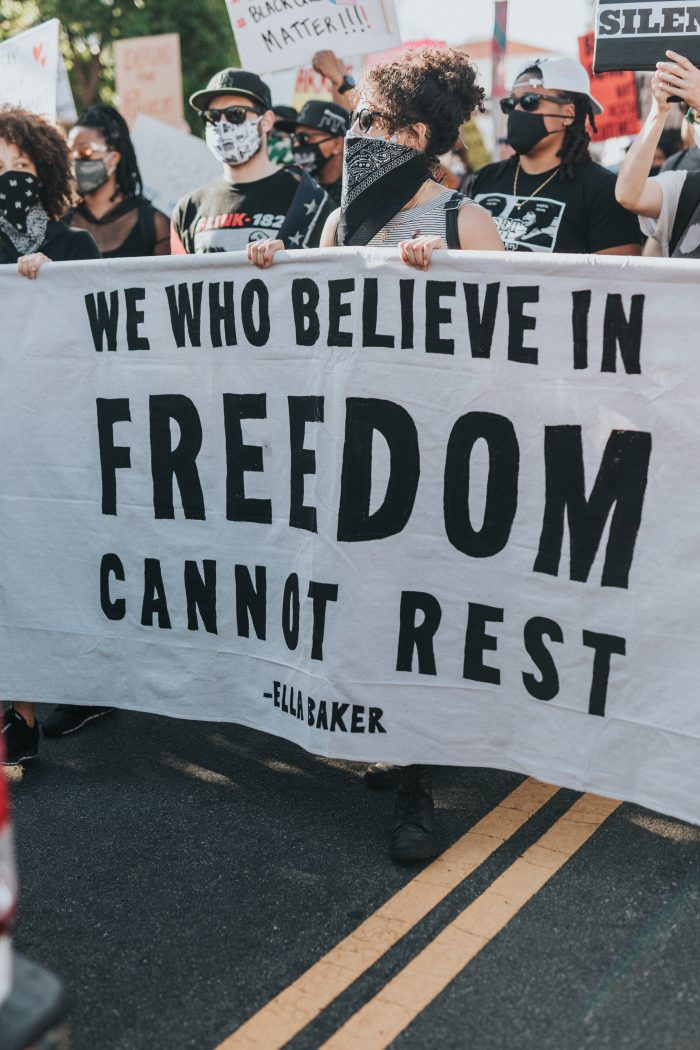
“If I cannot do great things, I can do small things in a great way.” ~ Martin Luther King
~
As I look at the images of British slave trader Edward Coulson’s statue being pulled down in Bristol, England, I cannot fathom how, as a country, we ever thought it was okay to have a statue—in a city with one of the largest black communities in the country—celebrating a man who saw people with a different skin colour as both less than human and a currency for business.
When did we become so numb and complacent as a society that we allowed—or didn’t even notice anymore—that abuse of human beings is celebrated right in front of us?
The pressure of COVID-19 is exposing the fault lines in our lives, and the unrelenting tension of our global situation is lowering our tolerance for what is acceptable to us. Where before we managed to ignore, numb out, or turn a blind eye to things in the world that “weren’t right,” the anaesthetic that has allowed us to “not notice” the injustice that has long been standing right in front of us is wearing off—and quickly.
Like addicts seeking a fix, our work, social life, shopping habits, social media addiction, or whatever our personal version of “the Kool-Aid” might be, has kept us “blind.”
Removed from those habits, we are no longer comfortably numb and content on our sofas of mediocrity, worshipping at the altar of beige, and putting all our energy into being normal.
We have, as so many others have said, been sent to our rooms and placed in discomfort, unable to distract ourselves with a toke of “not my problem if it doesn’t affect me,” or “I’m too busy to think of anything right now apart from my needs.” We have been forced to see things that before were hiding in plain sight.
Has the pressure and tension from COVID-19 finally made us all uncomfortable and angry enough to take action?
Has it broken us open and shaken us awake again, causing the zombie-like scales to fall from our eyes so that we might see that there is a level of injustice in the world that should not be tolerable to any reasonable human, or that (most importantly) we were guilty of participation in this system through our complacency?
The riots across the globe are showing us that we are clearly awake—and boy, are we angry.
Perhaps we are fueled by our personal guilt that we have never taken a stand before, or the realization that our unconscious judgements have harmed others more than we were aware.
Perhaps we are enraged by the fact that there are and always have been small actions that we could have taken but didn’t, or incensed by the fact that the thoughts we could have vocalised but chose not to, could have proactively ensured earlier on that our world was built on equality for all.
The worship of homogeny and sameness has provided fertile soil in our society for the discrimination of people who supposedly sit outside of the predefined boundaries of what the collective has defined as normal, average, or preferable.
Finally, we are becoming present and asking the “authorities” charged with protecting and caring for our collective to do something about this for us.
Like children, we are shouting, demanding our parents fix the problem. But my question is whether this situation is fixable by the patriarchal system of world power.
What if this is a problem that cannot be fixed just by our leaders? Perhaps the solution sits within society itself—by we individuals within it.
Perhaps we need to reframe the question from “What is wrong with our society?” to “What is wrong with the individuals in it?”
Because the uncomfortable truth is that our personal complacency allowed this to happen.
And this is not just about racism, but about all the areas where groups of people are being unfairly treated because of perceived differences: racism, homophobia, sexism—any ism that attempts to define a “normal person” and that creates a narrow parameter by which we may judge diversions from a norm.
Sadly, our media and the world around us reinforce every day that “normal and perfect” is white, middle class, and straight, and that what we should aim for is academic success, getting a secure job, attempting to keep our youth, and remaining thin—anything to own a home, hold down a marriage, acquire wealth and fame, and remain in control of our bodies.
Are we okay with this? Really?
As a human race we are inherently programmed to belong to a group. We are tribal by nature. We define ourselves not only by who we are, but what we are not.
We like to put people in boxes, label our race, our religion, our sexuality. That tendency to label and define creates the illusion that we are secure, and allows us to identify who the supposed enemy is. And that enemy is always the thing that looks or feels different.
So how do we break through the illusion of difference and separation and start to see a person’s humanness before anything else?
How, as a society, do we start honouring our uniqueness and stop striving to fit into the “normal” box (it’s a tiny box, right now) and celebrate the similarities in our differences?
How do we begin to see that our tribe is much bigger when we start evaluating what is inside a person to define our parameters for belonging, when humans are under psychological pressure?
Research shows that when we’re stressed, the parameters by which we decide whether a person belongs to our tribe and therefore needs our help, or is a possible threat to us and therefore requires outcasting, become smaller.
We are living in a world based on a patriarchal system that is not designed or fit for humans to thrive in. Worse still, the corporate jobs and financial pressures that come from pursuing the modern version of a successful life is creating an underlying stress and fear that means so many of us are in constant survival mode and are thus more inclined to narrow our field of acceptance of who is deserving of our communal resources.
Our current system is the perfect breeding ground for judgement and does not support understanding.
Our current system causes hate to rise and compassion to fall, persecution to escalate and tolerance to contract. We are steeped in an all-pervading soup of fear of loss of security and status.
The pressure of a world that treats all mortals as cogs in a business rather than the humans we all are is reinforcing the treatment of lives as valueless.
As an astrologer, I study the trends in the cosmos as well as in our society. My last report talked about the rise of personal activism energy and that being human is the new version of spirituality.
Activism is where lies the solution to harnessing the power of the individual for the sake of the wider community around us.
Activism is often seen as scary—an angry word, almost an affront to the “civilised world.” But activism is not angry; it is proactive, brave, and quietly focused. Activism is powerful in its calm intensity, and is the solution to creating a civilised world from the framework of one that has become anything but.
We don’t have to leave it to the famous people, writers, and thought leaders anymore to be the voice. Now it’s over to each and every one of us to pick up the baton and share with the world what we are taking on. It is our time to champion the cause and level with our community about where we will place our line in the sand when it comes to inequality.
To ensure we are clear about what this looks like for each of us, I challenge us all to write our personal manifestos for change in order to ensure that expressing our anger does not become the goal and that our target remains manifesting change through harnessing our personal power to create transformation.
And because we cannot all be the voice of everything (surely it’s better to divide and conquer when there is so much in the world that needs changing), it makes sense to allow those with expertise and experience in each area to lead the conversation.
The power of the individual becomes important when we all empower ourselves collectively.
A personal activism manifesto, in short:
I dedicate my voice to the empowerment of women. This is an area I know intimately. On other areas of inequality such as racism and homophobia, which don’t relate directly to me, I will amplify the voices of people to whom it does. At work and in my everyday world, I commit to raising my hand when I see any inequality or discrimination in action.
I will not buy any magazine or support any fashion brand where thin, young, and white makes up the majority of the faces represented, or where the full range of female embodiment is not fairly represented.
For the people I have responsibility for at work, I commit to helping them achieve a good work/life balance.
When spending my money, I will do my due diligence to ensure that the company I am buying from and therefore support has fair trade and the equality and health (including mental) of their employees at its heart.
I will continue to question everything in my life, and will make decisions based on what I know to be right, not what I am told is right.
I am committed to actively raising awareness that in some parts of our UK educational system, children are still discriminated against because of their dyslexia.
Most importantly, I will raise my boys to know that who they are is not what they do, or what they have achieved, that being themselves is the most important thing in life, however uncomfortable that might be to others. I will raise them to know to treat women and men of any colour, culture, or sexual preference with equal respect, and—most importantly—to follow their hearts, not security and achievement.
So what’s you personal manifesto for change in 2020?
Be bold, be brave, be truthful to yourself.
Write and share it with as many people as possible so that we can all start being clear with the people around us, the world at large, and the people in authority, about what we will and will not tolerate in life.
Most importantly, it should be an aid to holding ourselves accountable for the world in which we live.
Because it’s the small, great things we do in life that often make the biggest difference in the world.
~
Watch an anti-racism hour with Jane Elliott talking with Waylon Lewis of Elephant, here.


 Share on bsky
Share on bsky




Read 8 comments and reply